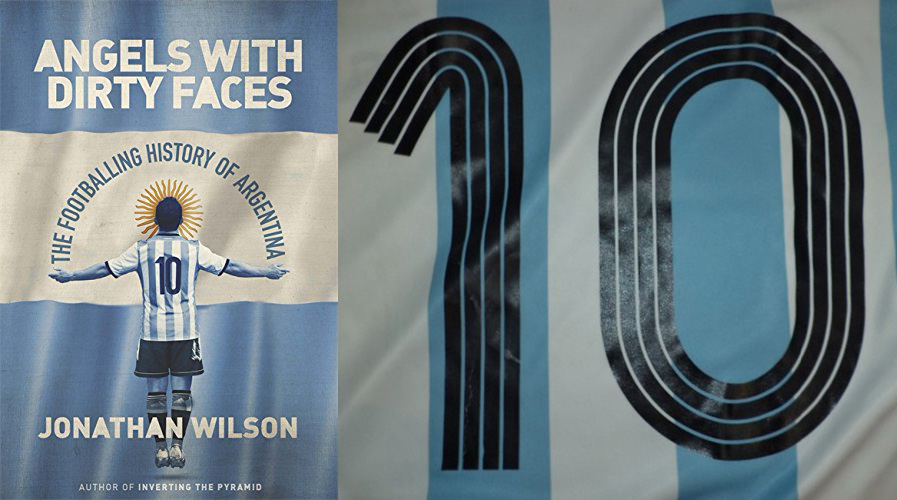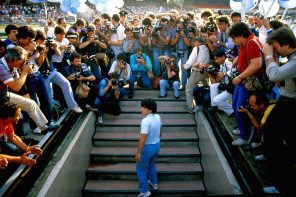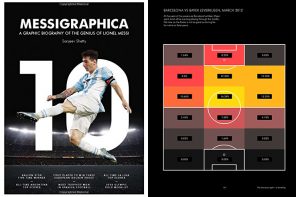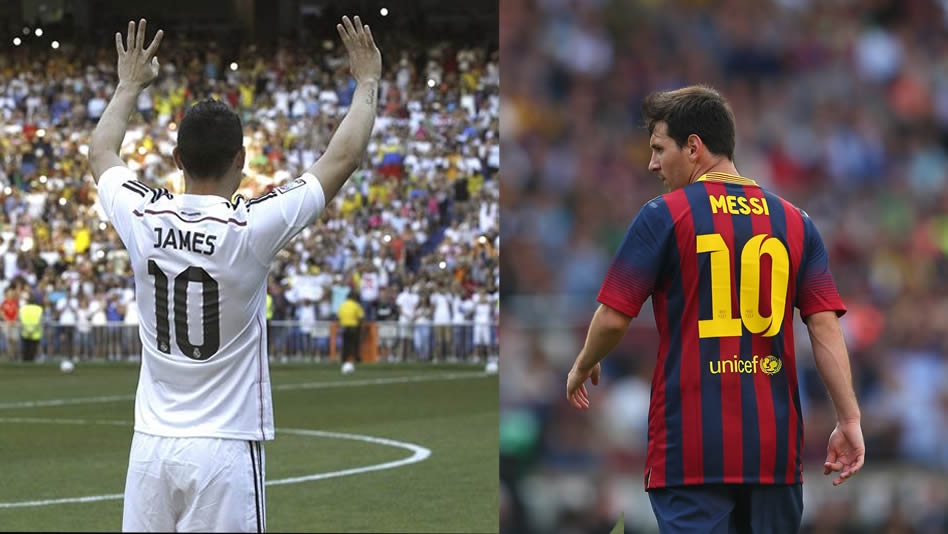The Footballing History of Argentina, we’ve been waiting for you.
When we heard that celebrated football writer, Jonathan Wilson (author of Inverting The Pyramid), was writing a book on this very topic we couldn’t wait to get our hands on a copy.
Not only is Argentina one of the true world giants of the game with a strong, proud and rich heritage, it’s also, perhaps, the true spiritual home of the Number 10 in its purest form. No other country prizes the enganche’s essence more – and Angels With Dirty Faces certainly doesn’t disappoint in revealing the reasons why.
Kindly enough, Jonathan was happy to spend time with us chatting about his book and sharing his knowledge (which is ridiculously vast!), and expand on why the fantasista is so fundamental to Argentina – a nation that has always focused on the game’s creator due to its infatuation with the Pibe.
With over 500 engrossing pages and a flick through of the index which regularly lists names like Beto Alonso, Bochini, Maradona, Messi, Riquelme, Sivori and their ilk, there’s huge bang for your buck.
Oh, and don’t forget that gorgeous cover art too…
Angels With Dirty Faces is available to buy now in Hardback or Digital form from Amazon.
For a taste of what to expect, and more besides, read our interview with Jonathan below. Enjoy.
Hi, Jonathan. What inspired you to write a book on the topic of Argentinean football?
JW: I first visited Argentina around 2006 when researching Inverting The Pyramid. As soon as I arrived in Buenos Aires something about the city just felt right; I felt so comfortable and very much at home. The more time I spent in Argentina, the more fascinating I found the place.
I slowly realised that there has been a lot written about Brazilian football – you’ve got Alex Bellos’ brilliant book on Brazilian footballing culture – but there wasn’t anything on Argentina. I then came to the realisation that, not only was there not a book written in English, but there’s not really the sort of history book – to my knowledge – that I wanted to read on the subject, written in Spanish. I wanted to look at the culture of the country and football, and why it has stood out the way it has.
Also, who were the great teams? Why did the early Racing team win seven league titles in a row? Why were River Plate great in the late 30s? What made those teams tick? Who were the great players and coaches? What were the great games and the tactics used?
I don’t think anything like that existed and that was the challenge: to write the sort of book that I would have liked to have read.
With all that research, did you become attached to any teams?
JW: I probably watched more of Boca than anyone else whilst I lived in Buenos Aires. I wanted them to win and I tried to care but it just wasn’t Sunderland!
As time’s gone by the club I feel most drawn to is Racing, just because of their history of failure. It’s an extraordinary story of how a club of their size went over 30 years without a title – that intrigues me – as does San Lorenzo’s.
But then part of me rebels against the ‘Big Five’ [Boca, River, Racing, San Lorenzo and Independiente] and the relentless focus on them. I remember when Estudiantes was challenging Velez Sarsfield for the title, with the two facing each other near the end of the season; but because of the Super Clasico being played during the same round of games, there was no mention of the title clash in Olé until around page 17! That frustrated me.
Velez have done some very good things and are pretty well run so I warmed to them too. Huracán seemed to always play on a Friday night so it became a regular occurrence for me to go and watch them with friends. I could go out of my apartment, turn right and walk for 5km straight to their stadium.
You couldn’t write a book on this topic without mentioning the great Number 10s from Argentina. Who can we expect to read about?
JW: There are a huge number in there. Messi and Maradona obviously; Riquelme, Bochini, Beto Alonso…the whole notion of the Number 10 is central to Argentinian football, and that’s one of the themes that underpins the book. In a sense, the Number 10 is Argentina, not just Argentinian football – it is the Argentinian character.
Editors note: Expanding on this, Jonathan goes on to enthrallingly discuss a section from Angels With Dirty Faces where the Gauchos, their culture, and a conflict of sorts with British ex-pats paved the way for two very different styles of play to develop in what was essentially an immigrant nation after the First World War.
From this, a distinct link can be traced to demonstrate how strong and inherent the ideology of the Number 10 player is to ‘real Argentinians’. It’s further cemented by the story of the Pibe (a street urchin kid), and how a prophesy describing Diego Maradona was foretold 32 years before he was even born!
Are there any Argentine No.10s you have a soft spot for?
JW: I don’t know if it’s a soft spot particularly, but Riquelme fascinates me. He’s completely the opposite of what I think a footballer should be and here’s why: If you grew up supporting Sunderland in the ‘80s you don’t have much time for skill!
But with Riquelme…just to have so little pace and still be a professional footballer! I never really ‘got’ him until I went to La Bombonera and saw him live. I just find him so interesting and someone I could write about forever.
Why do you think Argentina have produced a plethora of fantastic Number 10s down the years?
JW: If a country gets noted for producing a particular type of player then it becomes self-perpetuating, partly because when you’re a kid growing up, if your idol is Messi then you’re going to try and play like Messi – Messi’s idol was Pablo Aimar, so he tried to play like Pablo Aimar. I’m sure it was the same for Aimar too. The players you idolise are the players you copy so that strand is continued.
Clubs also deal in stereotypes, so if they feel they need a creative – a number 10 – they’ll look in Argentina where they believe there are loads. Economically, it also makes sense for the academies to try and produce these Number 10s because they know that’s what the European clubs are looking for.
These factors play a part, but really it’s just the culture of the country – that’s where they direct their skilful players into. There was a time when gifted English players were moved onto the wings because we thought creativity should come from the wide areas.
Finally, can you tell us about a particular story from the book involving a Number 10 which you enjoyed researching?
JW: I suppose about a slightly more obscure Number 10, and from one of the stories which most intrigued me in the book, was when the league was won by Quilmes – a tiny team – in 1978.
They were originally an English team and wear white shirts and blue shorts – like England. They had only won the league previously in 1912, then out of nowhere in 1978 with a player called ‘El Indio’ Omar Gomez.
[The book describes him as a player who ‘transformed three number 9s into top goalscorers’].He’s somebody who then simply disappears – he dropped off the map! He was hugely talented and skilful; anyone who speaks about that team says that ‘he was the one’.
I guess he was really unlucky, if that’s the right word, because later that year after winning the league, Quilmes sold him because they needed money, and he ended up playing in the indoor leagues of North America and never really came back into football.
His story was really interesting, and although not one of the top Argentine Number 10s, he’s one of those figures who exist on the periphery and in a sense that makes him more romantic – the soul of Argentinean football. He drifts in, does his thing, then drifts away.
A massive thank you to Jonathan for spending the time to discuss his excellent new book and indulge us further with all of our fantasista-focused questions (more of which will be revealed in future articles).
You can also follow Jonathan on Twitter @jonawils
A big thank you also to Orion Publishing.
Buy Angels With Dirty Faces now from Amazon in Hardback or Digital form.









